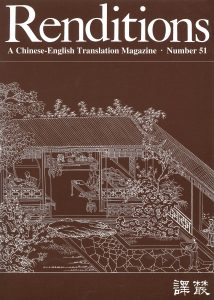Home / Renditions / Publications / Renditions Journal / No. 51
Renditions no. 51 (Spring 1999)

‘Chinese literature can be fun’ being the motto of Renditions, this issue is an offering of humorous writings by some of the best known classical writers such as Han Yu and Li Yu, as well as Lu Xun and Guo Moruo from the May Fourth generation, and from Bai folk literature. Also featuring excerpts from Tracks in the Snow by the Manchu Bannerman Linqing.
138 pages
Table of Contents
| Editor’s Page | 4 | |
| ———— | Humorous Classical Essay Translated by D. E. Pollard |
5 |
| Han Yu: Address to the Crocodiles of Chaozhou | ||
| Han Yu: Goodbye to Penury | ||
| Yuan Hongdao: The Rewards of Stupidity | ||
| Li Yu: Pleasant Diversions: Voice and Looks | ||
| Li Yu: Pleasant Diversions: Accomplishments | ||
| Li Yu: Pleasant Diversions: Literacy | ||
| Li Yu: Pleasant Diversions: Clothes | ||
| Linqing | Tracks in the Snow: excerpts Translated by Yang Tsung-han and John Minford |
29 |
| Lu Xun | After Nora Walks Out, What Then? Translated by Wen-chao Li |
66 |
| Guo Moruo | Marx Enters the Confucian Temple Translated by Timothy Wixted and Matthew Finkbeiner |
77 |
| Xi Chuan | Salute Translated by Maghiel van Crevel |
87 |
| Chan Po Chun | Addendum to a Conversation Translated by Janice Wickeri |
103 |
| ———— | Bai Tales Translated by Lucien Miller |
122 |
| A Legendary Sword River Carpenter | ||
| Wow-Wow the Bean Baby | ||
| Notes on Authors | 131 | |
| Notes on Contributors | 134 | |
| Books Received | 136 | |
| Announcement | 138 | |
Sample Reading
The material displayed on this page is for researchers’ personal use only. If you wish to reprint it, please contact us.
Tracks in the Snow: excerpts
By Linqing
Translated by Yang Tsung-han and John Minford
No. 51 Exploring the Beauty of the Sui Garden
Upon leaving the Fairy Hermitage and its delights, I lifted my head and saw that the setting sun was approaching the hills. Adjusting my dress, I was about to go on my way, when Wang Pushan asked me if I had ever visited Sui Garden.
“No,” I replied. Wang pointed to the east, to a pagoda, and said:
“That is Mount Xiaocang, and at its foot lies the garden first owned and constructed by a Director of the Imperial Silk Textile Workshop named Sui. In the days of Qianlong, the Academician Yuan expanded the garden when it came into his possession, and changed its name to another Sui, written differently and meaning something different.
“At various times he wrote six short essays in praise of his garden. Let me quote his own words:
My garden is both deep and spacious. Pass from one room to another: each one is enhanced with the shining radiance of mirrors, so luminous and bright, that when walking through them one loses one’s way. It is a place suitable for both walking and sitting. A high tower stands as ‘screen’ to the west. A clear stream flows eddying through it, ten thousand bamboos form a sea of verdure. You need never fear the oppressive heat of summer, neither heat-wave nor heat-stroke; and in winter since the windows are fitted with transparent glass, you may see the snow and not feel the wind. There are one hundred plum trees, more than ten groves of cassia trees. The trees cast clear shadows when the moon rises, their fragrance wafts on a gentle breeze. This is a place for the pleasures of spring and autumn alike. With continuous corridors and walkways to stroll in, one need not abandon one’s pleasure in walking even during rain, lightning, thunder or gale—it is a place suited even to stormy weather. “The Academician has passed away; the garden is deserted. And yet the charm of the place is unchanged! Why don’t you go there and take a look?” concluded Wang.
“I most certainly will!” said I. I found the path and had soon reached the garden. I saw that it backed onto the hill, which formed its rear wall. Buildings stood beside the stream, and a pavilion was hidden in the depths of a valley, while a bridge led to a short embankment. There was nothing grand or imposing about it, but it had a subtle charm and intricacy of its own, very like the delightful literary style of its most recent owner, the Academician Yuan of Xiaocang Mountain Studio.
This Academician was named Yuan Mei, and hailed from Qiantang in Zhejiang province. In the year jiwei of the Qianlong reign (1739) he passed his jinshi examination under my great-great-grand-uncle Sire Songyi, of whom this same Academician once wrote a biographical study, in which he expressed his profound gratitude to the kind favour of the senior scholar, who had been both his principal examiner and also on another occasion his sponsor. This biographical essay was included in Yuan Mei’s Complete Works from the Xiaocang Mountain Studio. I only regret that I was born too late to have had the privilege of paying homage to him in his garden.
Among the successful jinshi candidates of that year under my ancestor, those that went on to serve in lucrative official posts, or to enjoy great literary fame, were too many to be counted on one’s fingers. However, with Yuan Mei, there were Shen Guiyu, Board President, and Qi Cifeng, Board Vice-President. Together they were known as the Three Legs of the Tripod.
